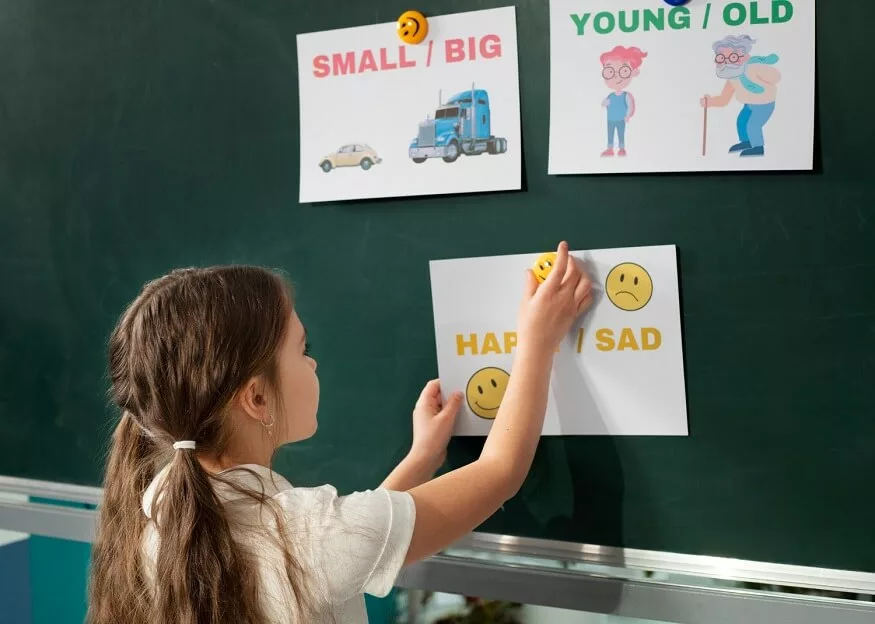Language Arts for children’s development refers to the educational curriculum and activities designed to enhance various aspects of language and literacy skills in young learners. It includes the skills in reading, writing, speaking, listening, critical thinking, and understanding. The purpose of Language Arts in children’s development is multifaceted.
Also Read : Understanding the Role of Drama and Arts in Education
Benefits and Importance of Language Arts for Children:
Here are some key points about the importance of language arts for children.
Communication Skills: Language Arts cultivate strong communication skills in children. Through reading, writing, speaking, and listening exercises, children learn to express themselves loudly, understand their thoughts and ideas, and participate in important conversations. These abilities are required for efficient communication in all aspects of life, from social interactions to educational activities and future jobs.
Literacy Development: Language Arts play a central role in promoting literacy. Reading activities expose children to a wide range of texts, expanding their vocabulary, comprehension skills, and knowledge. Children learn a love of reading as they engage with broad kinds of books, which may lead to a lifelong habit and deep appreciation for literature. Writing exercises help youngsters develop their voice, creativity, and capacity to present information effectively, allowing them to become excellent writers.
Critical Thinking: Language Arts enhance critical thinking skills in children. Reading comprehension tasks require them to analyse and interpret texts, make connections, draw inferences, and evaluate information. Writing assignments promote problem-solving abilities, as children must organise their thoughts, develop logical arguments, and support their ideas with evidence. These exercises teach youngsters to think critically, challenge expectations, and get a better awareness of their surroundings.
Imagination and Creativity: Language Arts nurture imagination and creativity in children. Reading exposes them to different worlds, characters, and ideas, stimulating their imagination and expanding their horizons. Writing activities allow children to explore their creativity, create stories, and express themselves artistically. Language Arts provides a safe and supportive environment for children to develop their unique ideas and unleash their creative potential.
Empathy and Emotional Development: Language Arts helps children develop empathy and emotional intelligence. Reading stories with diverse characters and perspectives fosters understanding and empathy toward others. Engaging in writing activities can introduce children to a range of emotions and situations assisting them in understanding their feelings and fostering empathy, towards others. Additionally, writing allows children to express their emotions, thoughts and personal experiences promoting development and self-awareness.
Cognitive Development: Language Arts contribute to cognitive development in various ways. Reading promotes cognitive skills such as attention, memory, and concentration. It exposes children to new ideas, information, and knowledge, expanding their intellectual capacity. Writing tasks require children to plan, organise, and structure their thoughts, enhancing their problem-solving and analytical abilities. Language Arts engages children in higher-order thinking skills, stimulating their intellectual growth and expanding their cognitive capacities.
Cultural Awareness: Language Arts promotes cultural awareness and understanding. Through literature from different cultures, children gain insights into diverse traditions, perspectives, and experiences. They develop a broader worldview, fostering tolerance, appreciation, and respect for different cultures and backgrounds. Language Arts serves as a vehicle to explore and celebrate diversity, nurturing global citizens who are culturally sensitive and open-minded.
Academic Success: Language Arts lays the foundation for academic success across all subjects. Strong literacy skills are crucial for comprehending and analysing information in other disciplines. Effective communication skills, developed through Language Arts, support students in presenting their ideas, participating in class discussions, and collaborating with peers. The critical thinking skills honed in Language Arts transfer to problem-solving in mathematics, science, and other subjects. Language Arts serve as a gateway to academic achievement and future success.
Lifelong Learning: Language Arts encourage a love for learning and a thirst for knowledge in children. Through reading, children discover the joy of exploring new ideas, worlds, and perspectives. Writing activities allow for being yourself and personal improvement. Language Arts provides students with the skills and resources they need to continue studying on their own throughout their lives, encouraging a lifelong love of reading, writing, and learning.
Also Read : The Role of Arts Education in a Well-Rounded Curriculum
Examples of How Language arts help children in Real time:
These examples illustrate the reasons why language arts are important and what is language arts and its role in children’s life.
Reading for Comprehension: Vijay, a 10-year-old student, is tasked with reading a science textbook chapter. Through her Language Arts skills, she can apply reading comprehension strategies such as making connections, identifying main ideas, and summarizing key points. This enables her to understand complex scientific concepts and effectively engage in class discussions.
Effective Communication: During a group project, Sunitha, an 8th-grade student, needs to present his findings to his classmates. Thanks to his Language Arts training, he can organise his thoughts, use appropriate vocabulary, and deliver a clear and concise presentation. His communication skills allow him to convey information effectively and engage his peers in meaningful discussions. This is one of the important reasons why language arts are important.
Creative Writing: Arjun, a 12-year-old student, participates in a writing contest. Her Language Arts skills help her craft a captivating story with well-developed characters and a compelling plot. Through her imaginative writing, she not only expresses her creativity but also improves her writing style, grammar, and vocabulary, enhancing her overall language proficiency.
Careers in Language Arts for Children:
- Author/Writer: Language Arts skills help children develop strong writing abilities, enabling them to pursue careers as authors or writers.
- Journalist: Language Arts skills, such as effective communication and critical thinking, are valuable for a career in journalism.
- Teacher: Language Arts knowledge allows children to become skilled educators, teaching others the power of language and literacy.
- Editor: Language Arts skills, including grammar and language proficiency, make children well-suited for careers as editors, proof-readers, or copywriters.
- Public Speaker: Language Arts help children develop confident speaking skills, which can lead to careers as public speakers or presenters.
- Translator: Language Arts expertise allows individuals to pursue careers as translators, helping bridge language barriers and facilitate communication.
- Communication Specialist: Strong language and communication skills acquired through Language Arts can lead to careers in public relations or corporate communications.
- Librarian: Language Arts knowledge and a love for literature make children well-suited for careers as librarians, fostering a love of reading in others.
- Content Creator: Language Arts skills are valuable in creating engaging content for various platforms, such as social media or digital marketing.
- Film/TV Writer: Language Arts skills in storytelling and dialogue make children well-equipped for careers as screenwriters or scriptwriters in the entertainment industry.
Also Read : The Benefits of Career Exploration for Children
Conclusion:
Language Arts is important for the development of children. These examples are crucial and useful, in demonstrating the essence of language arts, its significance for children and how it enhances their reading, writing, critical thinking, communication and connection with the world. Language arts equip students with skills and knowledge that will benefit them in their pursuits and personal endeavours. Visit EuroSchool to learn more about child development.









